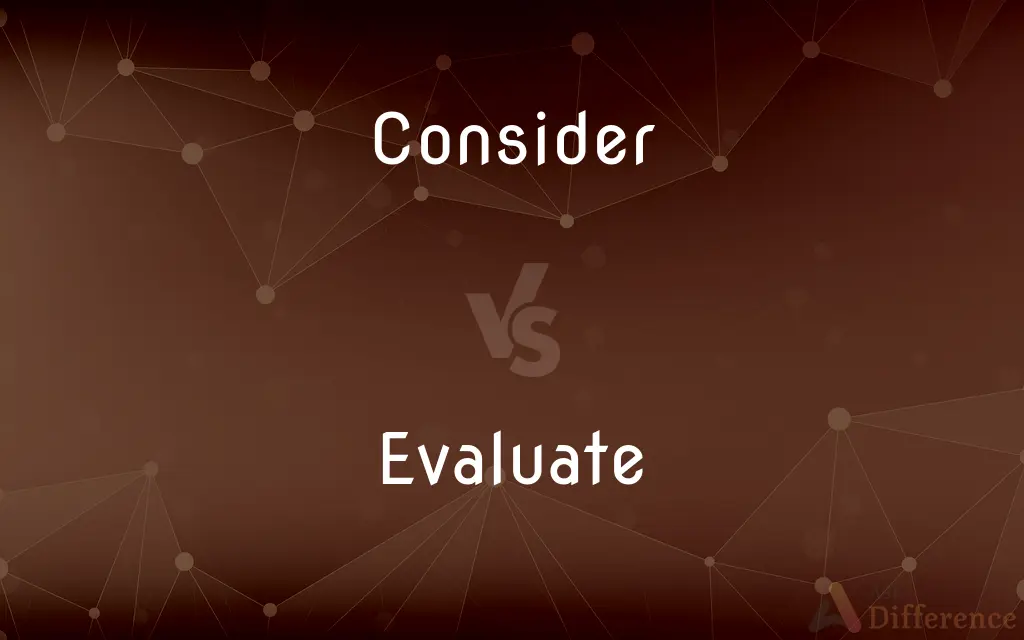Consider vs. Evaluate — What's the Difference?
By Tayyaba Rehman & Fiza Rafique — Updated on April 20, 2024
"Consider" involves thoughtful contemplation or regard for something, while "evaluate" entails assessing or judging the value or condition of something.

Difference Between Consider and Evaluate
Table of Contents
ADVERTISEMENT
Key Differences
When you "consider" something, you think about it carefully, often taking various aspects and potential consequences into account. Whereas "evaluate" specifically requires you to form a judgment about the worth, significance, or status of the subject at hand.
"Consider" can involve a broad or general contemplation without necessarily leading to a definitive conclusion or decision. On the other hand, "evaluate" typically aims to conclude with a clear assessment or decision based on criteria or standards.
In decision-making processes, to "consider" is to reflect on the possible options or strategies without immediate judgment. In contrast, to "evaluate" often means applying specific criteria to measure or rate these options.
The term "consider" is generally less formal and can be applied in more subjective and personal contexts. However, "evaluate" suggests a more systematic, objective approach, often used in professional or educational settings.
While "consider" allows for an open-ended process of thought, "evaluate" implies a closure that comes with the act of valuation, often leading to subsequent actions based on the evaluation results.
ADVERTISEMENT
Comparison Chart
Definition
To think about something carefully.
To judge or determine the significance of something.
Outcome
May not lead to a definitive conclusion.
Generally results in a judgment or decision.
Context
Broad, can be informal or personal.
More formal, often used in analysis or reviews.
Focus
Can be general contemplation.
Focuses on assessment using specific criteria.
Decision-making
Part of initial thinking in decision processes.
Used for finalizing decisions based on assessments.
Compare with Definitions
Consider
To regard or deem to be.
He is considered an expert in his field.
Evaluate
To assess the value or performance of.
The company regularly evaluates employee productivity.
Consider
To reflect on, especially to form an intention or plan.
They considered going on a vacation next summer.
Evaluate
To grade or rate based on a set standard.
Teachers evaluate students' assignments to grade them.
Consider
To take into account or include in a process.
Consider all variables before making a decision.
Evaluate
To critically analyze or appraise.
Evaluate the arguments presented in the debate.
Consider
To look attentively at.
Consider the painting closely to notice its details.
Evaluate
To calculate or compute.
He evaluated the total cost of the home renovation.
Consider
To think about something with attention.
She considered moving to a new city for better job opportunities.
Evaluate
To examine something to determine its worth.
Evaluate the condition of the car before buying it.
Consider
To think carefully about (something), especially before making a decision; I needed more time to consider my options. We considered taking the train instead of the bus.
Evaluate
Form an idea of the amount, number, or value of; assess
The study will assist in evaluating the impact of recent changes
A system for evaluating how well the firm is performing
Consider
To think or deem to be; regard as
Considered his friend a liberal on most issues.
Considered her contribution essential. See Usage Note at as1.
Evaluate
Find a numerical expression or equivalent for (an equation, formula, or function)
Substitute numbers in a simple formula and evaluate the answer
Consider
To suppose or believe
Considers waste to be criminal.
Considers that the mistake could have been prevented.
Evaluate
To ascertain or fix the value or amount of
Evaluate the damage from the flood.
Consider
To take into account; bear in mind
Her success is not surprising if you consider her excellent training.
Evaluate
To determine the importance, effectiveness, or worth of; assess
Evaluate teacher performance.
Consider
To show consideration for
Failed to consider the feelings of others.
Evaluate
(Mathematics) To calculate the numerical value of; express numerically.
Consider
To look at thoughtfully
Considered my shoes and thought they looked worn out.
Evaluate
(transitive) To draw conclusions from examining; to assess.
It will take several years to evaluate the material gathered in the survey.
Consider
To think carefully; reflect
Give me time to consider.
Evaluate
To compute or determine the value of (an expression).
Evaluate this integral.
Consider
(transitive) To think about seriously.
Consider that we’ve had three major events and the year has hardly begun.
How can you know everything about everything, if you won't consider any dissent?
Evaluate
To return or have a specific value.
Consider
(intransitive) To think about something seriously or carefully: to deliberate.
Evaluate
To fix the value of; to rate; to appraise.
Consider
(transitive) To think of doing.
I’m considering going to the beach tomorrow.
Evaluate
Place a value on; judge the worth of something;
I will have the family jewels appraised by a professional
Consider
(ditransitive) To assign some quality to.
Consider yourself lucky, but consider your opponent skillful.
I considered the pie undercooked.
Consider
(transitive) To look at attentively.
She sat there for a moment, considering him.
Consider
(transitive) To take up as an example.
Consider a triangle having three equal sides.
Consider
To debate (or dispose of) a motion.
This body will now consider the proposed amendments to Section 453 of the zoning code.
Consider
To have regard to; to take into view or account; to pay due attention to; to respect.
He never seems to consider the feelings of others.
Consider
To believe or opine (that).
Consider
To fix the mind on, with a view to a careful examination; to think on with care; to ponder; to study; to meditate on.
I will consider thy testimonies.
Thenceforth to speculations high or deepI turned my thoughts, and with capacious mindConsidered all things visible.
Consider
To look at attentively; to observe; to examine.
She considereth a field, and buyeth it.
Consider
To have regard to; to take into view or account; to pay due attention to; to respect.
Consider, sir, the chance of war: the dayWas yours by accident.
England could grow into a posture of being more united at home, and more considered abroad.
Consider
To estimate; to think; to regard; to view.
Considered as plays, his works are absurd.
Consider
To think seriously; to make examination; to reflect; to deliberate.
We will consider of your suit.
'T were to consider too curiously, to consider so.
She wished she had taken a moment to consider, before rushing down stairs.
Consider
To hesitate.
Consider
Deem to be;
She views this quite differently from me
I consider her to be shallow
I don't see the situation quite as negatively as you do
Consider
Give careful consideration to;
Consider the possibility of moving
Consider
Take into consideration for exemplifying purposes;
Take the case of China
Consider the following case
Consider
Show consideration for; take into account;
You must consider her age
The judge considered the offender's youth and was lenient
Consider
Think about carefully; weigh;
They considered the possibility of a strike
Turn the proposal over in your mind
Consider
Judge or regard; look upon; judge;
I think he is very smart
I believe her to be very smart
I think that he is her boyfriend
The racist conceives such people to be inferior
Consider
Look at attentively
Consider
Look at carefully; study mentally;
View a problem
Consider
Regard or treat with consideration, respect, and esteem;
Please consider your family
Common Curiosities
What does it mean to consider something?
To consider something means to think about it carefully, especially in order to make a decision or form an opinion.
Is evaluating a part of considering?
Yes, evaluating can be part of considering when a decision requires assessing various factors or options critically.
What does it mean to evaluate something?
To evaluate means to examine something thoroughly and judge its merit, quality, or value based on certain standards or criteria.
What skills are important when considering something?
Important skills include critical thinking, open-mindedness, and the ability to see multiple perspectives.
What is a common context for using the word "consider"?
"Consider" is commonly used when pondering possibilities or planning, e.g., "Please consider our offer."
How does the complexity differ between considering and evaluating?
Considering can be a simpler process of thinking about possibilities without requiring in-depth analysis, while evaluating generally involves deeper analysis and judgment.
What is a mistake commonly made when people consider things?
A common mistake is not considering all relevant factors or options, leading to poorly informed decisions.
What skills are crucial for evaluating something?
Crucial skills for evaluating include critical thinking, analytical ability, and often specific knowledge about the subject matter.
Can you give an example of a situation where you might consider but not evaluate?
One might consider going on vacation to several destinations without evaluating the specific details like cost or travel time.
Can "consider" and "evaluate" be used interchangeably?
While both involve thinking processes, they are not interchangeable. "Consider" is more about thoughtful deliberation, whereas "evaluate" involves making a judgment.
In what context is "evaluate" most appropriately used?
"Evaluate" is most appropriate in academic, professional, or technical contexts where a formal assessment is needed, e.g., "We need to evaluate the results of the experiment."
What is a typical error in evaluation processes?
A typical error in evaluation processes is bias, where the evaluator might favor certain outcomes based on personal preference.
How do cultural differences impact the process of considering and evaluating?
Cultural differences can impact what factors are prioritized or how judgments are formed, affecting both considering and evaluating.
What is the importance of context in using "consider" vs. "evaluate"?
The importance lies in the purpose of the thought process; "consider" is suited for general deliberation, while "evaluate" is for making informed judgments.
Can you provide an example where evaluation is necessary?
Evaluation is necessary when grading students' assignments or reviewing a project proposal for feasibility.
Share Your Discovery

Previous Comparison
Comedian vs. Entertainer
Next Comparison
Revolution vs. RevelationAuthor Spotlight
Written by
Tayyaba RehmanTayyaba Rehman is a distinguished writer, currently serving as a primary contributor to askdifference.com. As a researcher in semantics and etymology, Tayyaba's passion for the complexity of languages and their distinctions has found a perfect home on the platform. Tayyaba delves into the intricacies of language, distinguishing between commonly confused words and phrases, thereby providing clarity for readers worldwide.
Co-written by
Fiza RafiqueFiza Rafique is a skilled content writer at AskDifference.com, where she meticulously refines and enhances written pieces. Drawing from her vast editorial expertise, Fiza ensures clarity, accuracy, and precision in every article. Passionate about language, she continually seeks to elevate the quality of content for readers worldwide.
















































